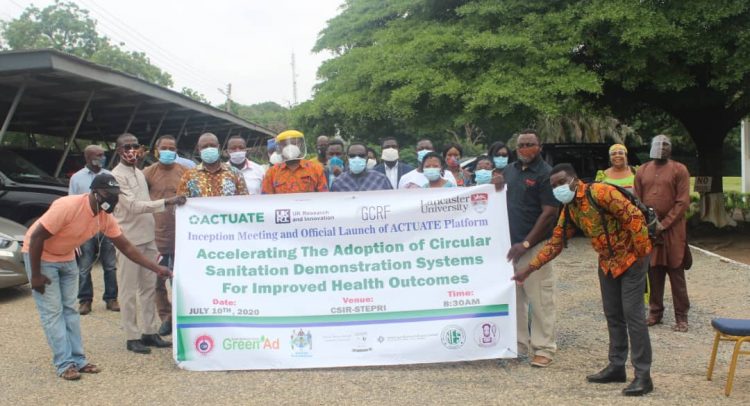The HATOF Foundation, a non-governmental environmental organization, in partnership with the Council for Scientific and Industrial Research’s Institute of Industrial Research (CSIR-IRR), and the Lancaster University, United Kingdom, has launched a new project to demonstrate the profitable use of waste.
The 18-month project dubbed “Accelerating the Adoption of Circular Sanitation Demonstration Systems for Improved Health Outcomes (ACTUATE), is aimed at demonstrating how energy can be generated through the use of an anaerobic digestion system.
The system, apart from generating energy for lighting, will also produce sustainable fertilizer for crops and improve sanitation in communities.
Chief Executive Officer (CEO) of HATOF Foundation, Samuel Dotse, said the project, being funded by the Global Challenges Research Fund through the UK Research and Innovation, will support governments’ efforts at managing waste using a community-led approach.
Mr Dotse explained that the first anaerobic digester will be established at the Umar Bun Islamic School at Madina in Accra, while the community-based pilot demonstration of the bio-energy systems will support an accelerated uptake of a safe circular water economy connecting waste, human health, energy, food and soil security.
He added that the HATOF Foundation would support cultural and generational changes in thinking and understanding the paradigm of safer circular economy through awareness creation, social mobilization and environmental campaigns.
ACTUTATE Project Coordinator, Dr Richard Bayitse, explained that students of the Umar Bun Islamic School would be engaged to be actively involved in the project.
According to him, the bio-digester would be different from the fixed-dome type that are buried in the ground adding that it would be a surface bio-digester to be built on the already existing septic tank in the school.
Dr Bayitse said the primary beneficiary of the project will be the students who will use the energy in their science lab and fertilizer to grow crops in the school garden with Blue Skies Company being the secondary beneficiary of the fertilizer.
Special Advisor to the Minister of Environment, Science, Technology and Innovation, Oliver Boakye, commended the collaborators for supporting the country’s waste management system.
“This project seeks to demonstrate the way to provide a source of affordable and sustainable electricity for unconnected and hard to reach communities,” he said.
Mr Boakye said proper waste management would not only improve the health of the people, especially in this Covid-19 period, but play a vital role in reducing poverty and generating wealth for the people.
The Lancaster University is leading the project, which is also being piloted in Nigeria to improve sanitation in West Africa as a whole.
Associate Dean for Research, Faculty of Health and Medicine, Division of Biomedical and Life Sciences, Lancaster University, Professor Roger Pickup, was hopeful the project would have the needed impact on improving the sanitation levels in communities and reduce waste.
By Jamila Akweley Okertchiri


